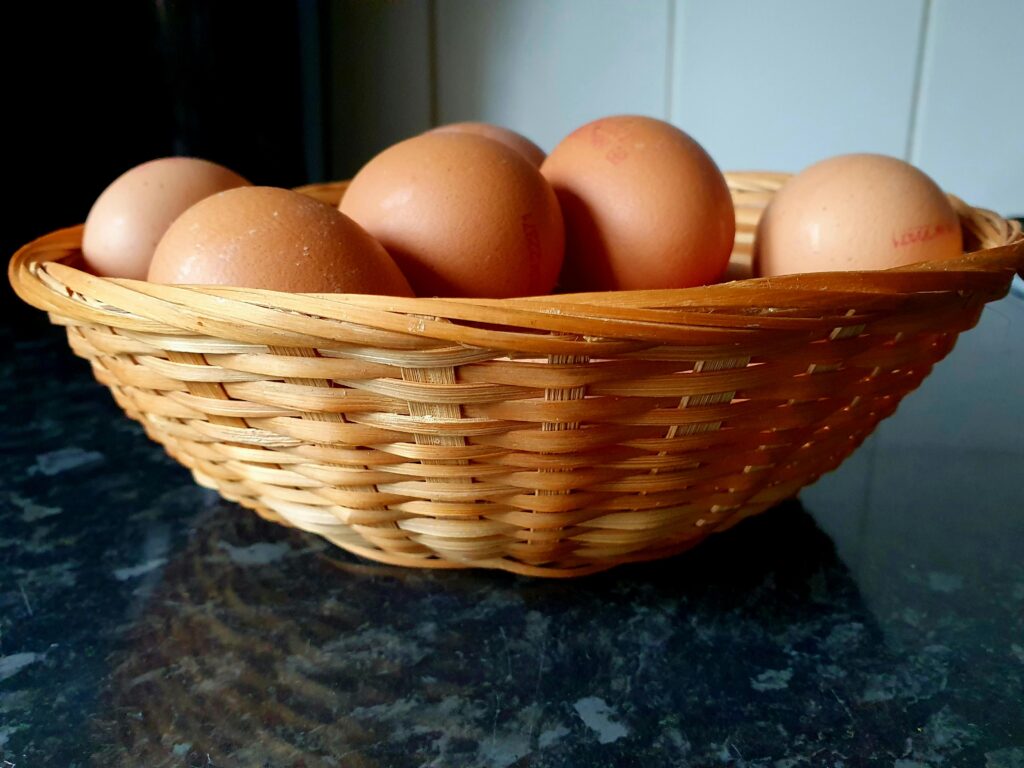Introduction: The Shelf Life of Farm Fresh Eggs
Ever wondered just how long farm fresh eggs can safely sit on your kitchen counter? You’re not alone. With the rise of backyard chickens and farmers’ markets, more households are turning to unwashed, farm-fresh eggs over store-bought options. But the rules are different when it comes to storage. Unlike commercial eggs, farm eggs often retain their natural bloom—a protective layer that dramatically affects their shelf life.
In this guide, we’ll crack open everything you need to know: the science, the myths, and the exact time frame farm fresh eggs can stay unrefrigerated without going bad. From optimal storage tips to homesteader-approved tricks, we’ll make sure your eggs stay fresh and safe.

Photo by Rimsha Noor on Unsplash
Why Farm Fresh Eggs Are Different From Store-Bought
Farm fresh eggs differ from store-bought eggs in one major way: they typically aren’t washed. In the U.S., commercial eggs are washed and sanitized, stripping away the “bloom” (also called the cuticle), a natural coating that seals the shell and protects the contents from bacteria.
Here’s a quick comparison:
| Feature | Farm Fresh Eggs (Unwashed) | Store-Bought Eggs (Washed) |
| Bloom (Protective Layer) | Intact | Removed |
| Refrigeration Required | Not Immediately | Yes |
| Shelf Life on Counter | 2–4 weeks | Not recommended |
| Taste | Richer, more natural flavor | Often blander |
That natural coating is why farm eggs can last much longer on the counter than supermarket ones—as long as they’re stored properly.
How Long Do Farm Fresh Eggs Last Unrefrigerated?
The exact length depends on whether the bloom is still intact.
With Bloom (Protective Coating)
If your eggs are unwashed, the bloom is still present. These eggs can last:
- 2 to 4 weeks on the counter at room temperature (ideally 60–70°F or 15–21°C)
- 3+ months in the fridge if stored shortly after laying
This is how eggs are traditionally handled in many European countries.
Without Bloom
If you’ve washed the eggs, they should be refrigerated right away. Without the bloom:
- Max 1–2 days on the counter (if at all)
- Up to 2 months refrigerated
Washing compromises the shell’s ability to keep bacteria out. So if you’re unsure, it’s safer to refrigerate.
Key Factors Affecting Counter Shelf Life
Several elements influence how long your farm fresh eggs will last unrefrigerated:
Ambient Temperature
- Ideal range: 60–70°F
- Too hot? Speeds up spoilage
- Too cold? May cause condensation that compromises shell integrity
Humidity Levels
Low humidity is best. High humidity can lead to mold growth or encourage bacteria to penetrate the shell.
Shell Integrity
Even a tiny crack can be a gateway for bacteria. Discard or cook cracked eggs immediately—don’t leave them on the counter.
How to Test If an Egg Is Still Fresh
If you’re unsure whether an egg is still good, try one of these simple tests:
Float Test
- Fill a bowl with water.
- Gently place the egg in the water.
| Result | Meaning |
| Sinks flat | Very fresh |
| Stands upright | Still edible, but older |
| Floats | Discard immediately |
Shake Test
- Hold the egg next to your ear.
- Shake gently.
A sloshing sound means the yolk has started to break down—time to toss it.
Visual and Sniff Check
- Cracks, discoloration, or a sulfur smell? Don’t eat it.
- A good egg should look clear and firm with a bright yolk.
Best Practices for Storing Farm Fresh Eggs
Proper storage prolongs freshness and ensures safety.
Do’s and Don’ts
Do keep them in a cool, shaded area (like a pantry)
Do rotate eggs—oldest to newest
Don’t store near strong odors—they’re porous and absorb smells
Don’t wash unless you plan to refrigerate
Room Temperature vs. Refrigeration
| Storage Method | Ideal For | Shelf Life |
| Countertop (with bloom) | Immediate use | 2–4 weeks |
| Refrigerator (washed) | Long-term preservation | Up to 3 months |

Photo by Tati Visual on Unsplash
Country Comparisons: U.S. vs. Europe
In Europe, eggs are often sold and stored unrefrigerated. That’s because regulations there prohibit washing, keeping the protective bloom intact.
In contrast, U.S. guidelines require washing and refrigerating for safety. Both systems work—but they require different handling.
Source: USDA Egg Safety
Nutritional Benefits of Farm Fresh Eggs
Farm fresh eggs tend to:
- Have more omega-3s and vitamin A
- Contain less cholesterol and saturated fat
- Offer brighter yolks due to healthier hen diets
That’s why many consider them a better nutritional choice than store-bought alternatives.
Common Myths About Storing Fresh Eggs
There are quite a few misconceptions surrounding farm egg storage. Let’s crack a few of the most common ones:
- Myth 1: All eggs must be refrigerated immediately.
Truth: Only if they’re washed. Unwashed farm fresh eggs with bloom can safely sit out for weeks. - Myth 2: Brown eggs last longer than white eggs.
Truth: Shell color has zero impact on shelf life—what matters is the bloom and storage method. - Myth 3: You can tell an egg is bad just by looking.
Truth: Not always. That’s why float tests and sniff checks are essential. - Myth 4: Room-temperature eggs are unsafe for baking.
Truth: On the contrary, room-temp eggs improve emulsification, making them great for baking—as long as they’re still fresh.
Risks of Leaving Eggs Out Too Long
While farm fresh eggs have more leeway, they’re not invincible. Here’s what can happen when eggs sit out too long:
- Bacterial contamination (Salmonella): Especially if cracked or stored in warm, humid environments.
- Dehydration: Over time, moisture evaporates through the shell, shrinking the egg contents.
- Off-odors or sour taste: As the interior breaks down, flavor degrades rapidly.
Key advice? Use common sense and check before you crack.
Expert Tips From Homesteaders
Longtime egg producers and homesteaders have refined best practices through trial and error. Here are a few pro tips:
- Date each egg with a pencil when collected—store oldest first.
- Use egg skelters (spiral racks) to track freshness visually.
- Don’t wash until ready to use or refrigerate.
- Keep eggs out of sunlight, even indoors, to maintain quality.
- Label eggs that might have had exposure to rain or mud—they may have compromised bloom.
How to Wash Farm Fresh Eggs Safely
If you must wash them (e.g., they’re dirty or going into cold storage), follow these steps:
- Use warm water (warmer than the egg temp) to avoid drawing bacteria in.
- Gently scrub with a dry brush or cloth if minimal debris is present.
- Only use egg-safe detergent if necessary—never dish soap.
- Dry thoroughly before storing in the fridge.
- Label as washed so you don’t forget to keep them cold.
Pro Tip: Washed eggs must go straight to refrigeration—no counter time after that.

Photo by Zobia Shakar on Unsplash
How Long Do Washed Eggs Last on the Counter?
Once the bloom is washed off, you drastically reduce shelf life:
- At room temp: Less than 24 hours (risky)
- Refrigerated immediately: 2–3 months shelf life
To avoid waste, only wash right before use or refrigeration.
When Should You Refrigerate Farm Fresh Eggs?
- If you’ve washed them
- If eggs are older than 3 weeks
- If temperatures exceed 75°F (24°C)
- If there are any small cracks
- If you plan to store them more than a month
It’s always a good idea to refrigerate when in doubt—it extends freshness without harm.
Seasonal Storage Adjustments
Your local climate makes a big difference in how you should handle storage.
| Season | Counter Storage Tips |
| Spring | Ideal time—mild temps allow max shelf life |
| Summer | High heat? Refrigerate after 1 week max |
| Fall | Still safe on counter if home remains cool |
| Winter | Be cautious of freezing—eggshells may crack |
In warm climates like the southern U.S. or tropical zones, it’s best to err on the side of refrigeration year-round.
Using Farm Eggs for Cooking & Baking
Fresh, room-temp eggs offer numerous culinary advantages:
- Baking: Room-temp eggs emulsify better in batters and doughs.
- Frying/Poaching: Fresher eggs hold their shape better in hot water.
- Boiling: Slightly older eggs (7–10 days) peel more easily.
Farm fresh eggs have stronger yolks and firmer whites—a chef’s secret weapon.
Frequently Asked Questions (FAQs)
1. Can farm fresh eggs sit out all day?
Yes, as long as they are unwashed and have the bloom intact. They can safely sit out for 2 to 4 weeks depending on room temperature.
2. How do I know if my farm fresh egg is bad?
Use the float test, sniff test, or crack it open. A bad egg will either float, smell off, or look watery/discolored inside.
3. Do eggs last longer in the fridge or on the counter?
In the fridge, washed or unwashed eggs can last 2–3 months. On the counter, only unwashed eggs are safe, and last up to 4 weeks.
4. Why are farm eggs not refrigerated in Europe?
In the EU, regulations ban egg washing. Since the protective bloom is kept intact, refrigeration isn’t necessary.
5. What temperature is too warm for storing farm eggs on the counter?
Above 75°F (24°C), eggs can spoil faster. In warmer climates, it’s best to refrigerate after 5–7 days.
6. Can I return refrigerated eggs to room temp storage?
No. Once cold, condensation can form if left out, potentially pulling bacteria into the shell.

Photo by Laize de Souza on Unsplash
Conclusion
So, how long do farm fresh eggs last on the counter? If left unwashed with their natural bloom, they can stay fresh for 2 to 4 weeks in cool conditions—no fridge required. But once washed or cracked, the clock ticks faster, and refrigeration becomes necessary.
